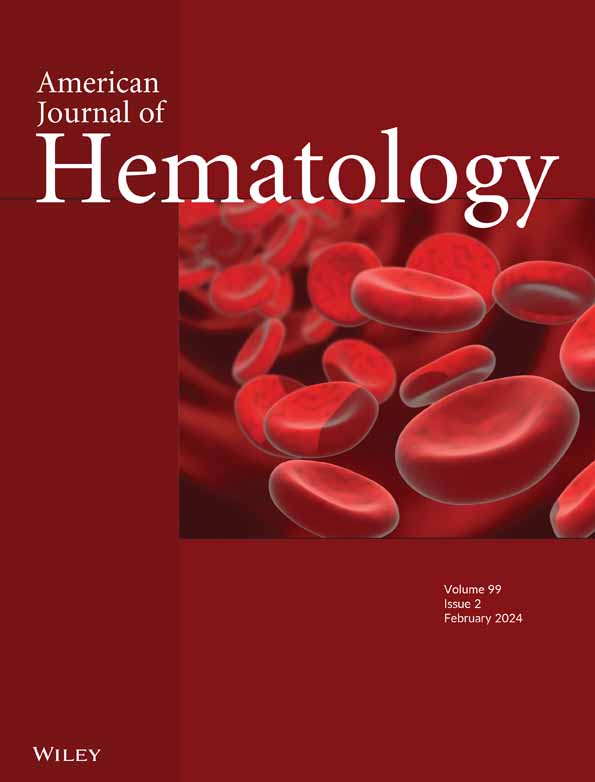Reduced-Dose Versus Full-Dose Direct Oral Anticoagulants for Extended Secondary Venous Thromboembolism Prophylaxis in Cancer Patients: A Systematic Review and Meta-Analysis of Randomized Trials.
IF 9.9
1区 医学
Q1 HEMATOLOGY
引用次数: 0
Abstract
Patients with cancer are at high risk for both recurrent venous thromboembolism (VTE) and anticoagulant-associated bleeding. Direct oral anticoagulants (DOACs) have become a standard option for long-term VTE management; however, the safety and efficacy of reduced-dose regimens in cancer populations remain uncertain. We conducted a systematic review and meta-analysis of randomized controlled trials (RCTs) comparing reduced-dose versus full-dose DOACs in adult patients with active cancer and prior VTE who had completed at least 6 months of therapeutic anticoagulation. Embase and MEDLINE were searched from inception through April 1, 2025. Primary outcomes were recurrent VTE and a composite of major bleeding and clinically relevant non-major bleeding. Pooled risk ratios (RRs) were calculated using a random-effects model. Three RCTs including 2178 patients were eligible. There was no significant difference in recurrent VTE between reduced-dose and full-dose apixaban or rivaroxaban (RR, 0.87; 95% CI, 0.10-7.83; I2 = 0%). The composite bleeding risk was numerically lower with reduced-dose DOACs (RR, 0.77; 95% CI, 0.55-1.06; p = 0.07; I2 = 0%). In a subgroup analysis of cancer-only trials (API-CAT and EVE; n = 2126), reduced-dose apixaban significantly reduced the risk of clinically relevant bleeding (RR, 0.77; 95% CI, 0.60-0.99; p = 0.05) without increasing VTE recurrence. Reduced-dose apixaban or rivaroxaban offers comparable efficacy to full-dose regimens for extended secondary VTE prophylaxis in cancer patients, with a potential reduction in clinically relevant bleeding. These findings support consideration of dose de-escalation in select patients with active cancer.减少剂量与全剂量直接口服抗凝剂对癌症患者继发性静脉血栓栓塞的预防作用:随机试验的系统评价和荟萃分析
癌症患者复发静脉血栓栓塞(VTE)和抗凝相关出血的风险都很高。直接口服抗凝剂(DOACs)已成为长期静脉血栓栓塞治疗的标准选择;然而,减少剂量方案在癌症人群中的安全性和有效性仍不确定。我们对随机对照试验(rct)进行了系统回顾和荟萃分析,比较了在已完成至少6个月抗凝治疗的活动性癌症和既往静脉血栓栓塞的成年患者中减少剂量和全剂量DOACs。Embase和MEDLINE从创建到2025年4月1日进行了搜索。主要结局是静脉血栓栓塞复发、大出血和临床相关的非大出血。综合风险比(rr)采用随机效应模型计算。3项随机对照试验纳入2178例患者。阿哌沙班或利伐沙班减少剂量组与全剂量组复发性静脉血栓栓塞发生率无显著差异(RR, 0.87; 95% CI, 0.10-7.83; I2 = 0%)。减少DOACs剂量的复合出血风险在数值上较低(RR, 0.77; 95% CI, 0.55-1.06; p = 0.07; I2 = 0%)。在一项仅针对癌症的试验(API-CAT和EVE, n = 2126)的亚组分析中,减少剂量的阿哌沙班可显著降低临床相关出血的风险(RR, 0.77; 95% CI, 0.60-0.99; p = 0.05),且不会增加静脉血栓栓塞的复发。减少剂量阿哌沙班或利伐沙班对癌症患者继发性静脉血栓栓塞的预防提供了与全剂量方案相当的疗效,并有可能减少临床相关出血。这些研究结果支持在选择性活动性癌症患者中考虑剂量递减。
本文章由计算机程序翻译,如有差异,请以英文原文为准。
求助全文
约1分钟内获得全文
求助全文
来源期刊
CiteScore
15.70
自引率
3.90%
发文量
363
审稿时长
3-6 weeks
期刊介绍:
The American Journal of Hematology offers extensive coverage of experimental and clinical aspects of blood diseases in humans and animal models. The journal publishes original contributions in both non-malignant and malignant hematological diseases, encompassing clinical and basic studies in areas such as hemostasis, thrombosis, immunology, blood banking, and stem cell biology. Clinical translational reports highlighting innovative therapeutic approaches for the diagnosis and treatment of hematological diseases are actively encouraged.The American Journal of Hematology features regular original laboratory and clinical research articles, brief research reports, critical reviews, images in hematology, as well as letters and correspondence.

 求助内容:
求助内容: 应助结果提醒方式:
应助结果提醒方式:


